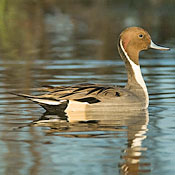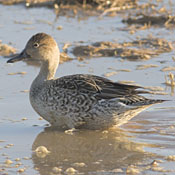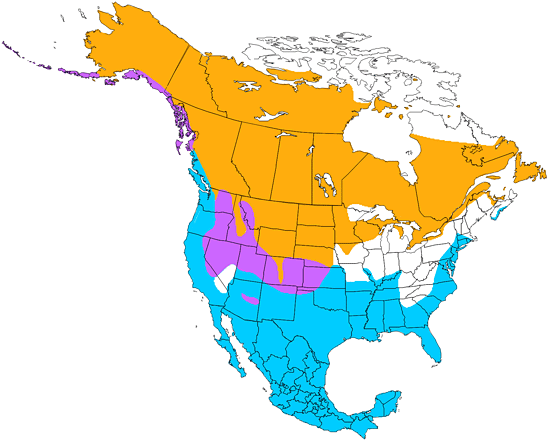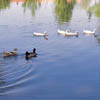Northern Pintail
Anas acuta

Duck Like

Length: 26 in. (66 cm )
Often wintering in large numbers on freshwater lakes, ponds and marshy areas, in the summer it nests in a wide range of habitats from boreal forest lakes, to tundra and marshy pond edges. The nest is usually near water but sometimes under shrubs or in stubble fields. It is made of grass and lined with feather down. The pintail feeds from near the water\'s surface on seeds, aquatic vegetation and a few small fish and aquatic invertebrates. This duck species occurs throughout the world including northern South America, Europe, Asia, Africa, and the South Pacific.
The four-digit banding code is NOPI.
Bibliographic details:
- Article: Northern Pintail
- Author(s): Dr. Biology
- Publisher: Arizona State University School of Life Sciences Ask A Biologist
- Site name: ASU - Ask A Biologist
- Date published:
- Date accessed:
- Link: https://askabiologist.asu.edu/activities/bird/northern-pintail
APA Style
Dr. Biology. (). Northern Pintail. ASU - Ask A Biologist. Retrieved from https://askabiologist.asu.edu/activities/bird/northern-pintail
Chicago Manual of Style
Dr. Biology. "Northern Pintail". ASU - Ask A Biologist. . https://askabiologist.asu.edu/activities/bird/northern-pintail
Dr. Biology. "Northern Pintail". ASU - Ask A Biologist. . ASU - Ask A Biologist, Web. https://askabiologist.asu.edu/activities/bird/northern-pintail
MLA 2017 Style
Be Part of
Ask A Biologist
By volunteering, or simply sending us feedback on the site. Scientists, teachers, writers, illustrators, and translators are all important to the program. If you are interested in helping with the website we have a Volunteers page to get the process started.





